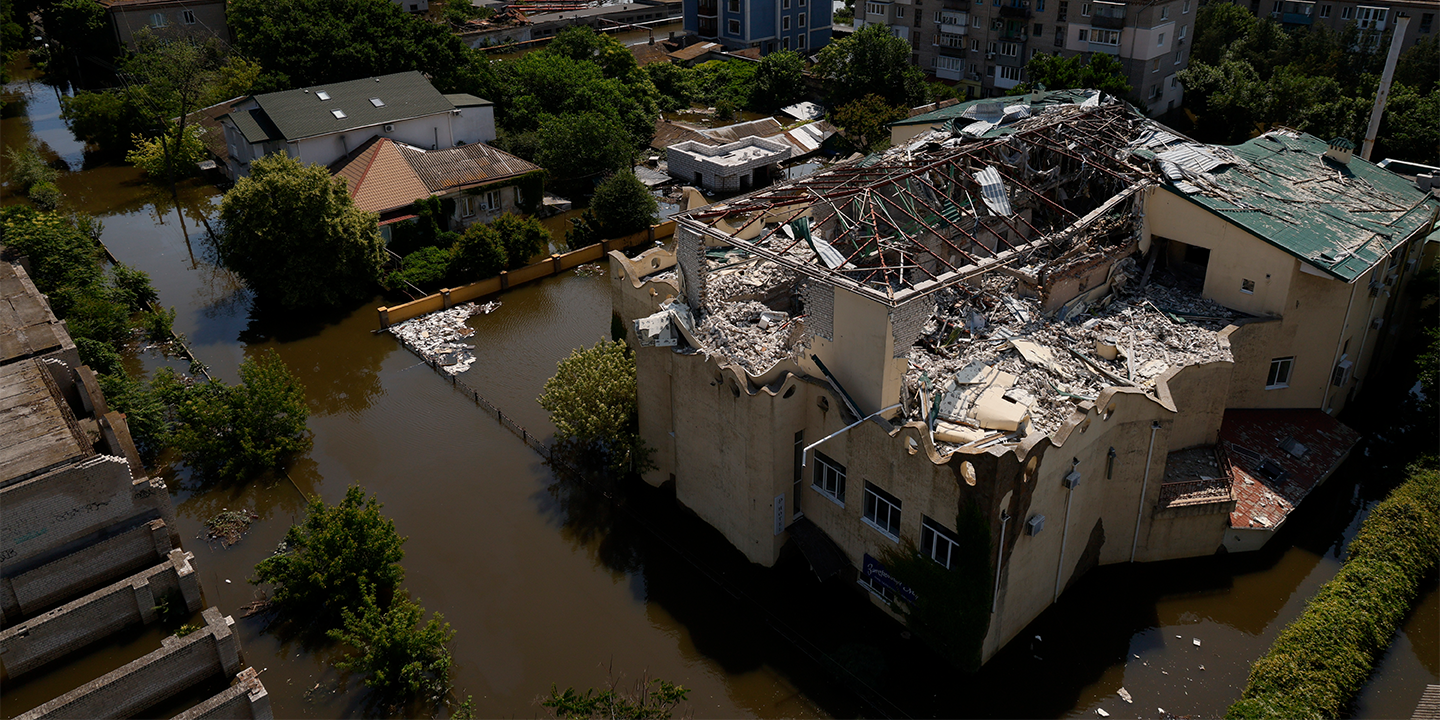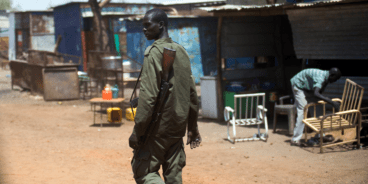

Atrocity Alert No. 351: Ukraine, Ethiopia and Syria
Atrocity Alert is a weekly publication by the Global Centre for the Responsibility to Protect highlighting situations where populations are at risk of, or are enduring, mass atrocity crimes.
DESTRUCTION OF UKRAINE’S KAKHOVKA DAM CAUSES WIDESPREAD DEVASTATION
On 6 June the Russian-controlled Kakhovka dam in southern Ukraine was destroyed, unleashing a torrent of water and submerging dozens of villages across Kherson oblast. Floodwaters forced thousands of civilians to flee on boats across dozens of communities on both sides of the Dnipro River, which has served as the frontline since Russian troops withdrew from Kherson city in November 2022. A deliberate explosion inside the dam was the most likely cause of its collapse, according to engineering and munitions experts. Both Russian and Ukrainian authorities have blamed each other for the destruction. The UN Office for the Coordination of Humanitarian Affairs reported that as of 11 June at least 46 towns and villages remain flooded in Kherson oblast and 31 in Mykolaivska oblast.
On the day of the collapse, UN Secretary-General António Guterres stated that “Today’s tragedy is yet another example of the horrific price of war on people. The floodgates of suffering have been overflowing for more than a year. That must stop. Attacks against civilians and critical civilian infrastructure must stop. We must act to ensure accountability and respect for international humanitarian law.” Under International Humanitarian Law, works and installations containing dangerous forces, such as dams, must receive special protection as their destruction can result in severe loss for civilians.
The collapse of the dam has exacerbated the plight of civilians living in a frontline zone that was already devastated by the invasion. Active shelling continues across flood-affected areas in Kherson, impacting safe evacuations and the delivery of life-saving assistance. According to the head of the regional military administration, Russian forces have launched at least 70 attacks on the city since the dam broke.
The destruction of the Kakhovka dam will also have catastrophic consequences for locating mines, unexploded ordnance and explosive devices, as fast-moving water shifts projectiles to areas previously assessed as safe. Displaced explosive devices pose an immediate danger to residents and humanitarian workers as the floodwaters do not deactivate such devices. According to Ukrainian authorities, Kherson is the most mine-contaminated oblast. Since the invasion on 24 February 2022 the UN has verified 879 casualties from landmines and unexploded remnants of war.
While Russian and Ukrainian investigations continue into the cause of the disaster, all parties must evacuate civilians to the fullest extent possible and provide medical care and other humanitarian assistance.
FOOD AID SUSPENDED IN ETHIOPIA FOLLOWING REPORTS OF DIVERSION AND THEFT
Last week the United States Agency for International Development (USAID) and the UN World Food Programme (WFP) announced the temporary suspension of food aid to Ethiopia after discovering that supplies were being diverted and stolen. Although responsibility for the diversion remains unclear, the United States claims it is “widespread and coordinated.” The WFP stated on Friday, 9 June, that while it is temporarily suspending food deliveries, it is also “accelerating efforts to roll out enhanced safeguards and controls that will ensure humanitarian food assistance reaches targeted, vulnerable people across Ethiopia.” The suspension will detrimentally impact populations already affected by conflict and the Horn of Africa’s worst drought in four decades, which have left more than 20 million people across Ethiopia in need of assistance.
The announcement of the nationwide food aid suspension follows an earlier suspension of food deliveries to the Tigray region during late April. In a statement on 3 May USAID Administrator Samantha Power said that the agency “uncovered that food aid, intended for the people of Tigray suffering under famine-like conditions, was being diverted and sold on the local market.” Approximately 5.4 million people – 90 percent of the region’s population – rely on humanitarian assistance.
Since the outbreak of the conflict in northern Ethiopia in November 2020, several UN bodies, including the Human Rights Council-mandated International Commission of Human Rights Experts on Ethiopia, and international human rights groups have documented potential war crimes and crimes against humanity, including, among others, the systematic destruction of food, water and health infrastructure. Humanitarian convoys were also routinely blocked, attacked and looted by parties to the conflict. In June 2021 Mark Lowcock, then Head of the UN Office for the Coordination of Humanitarian Affairs, accused Eritrean forces of using starvation as a weapon of war against the Tigrayan population.
The government of Ethiopia, supported by the international community, must ensure an efficient aid distribution system in Ethiopia with strong safeguards and oversight measures to avoid diversion and theft. Perpetrators responsible for stealing and diverting supplies and objects indispensable to the survival of the civilian population need to be held accountable.
WOMEN AND GIRLS AFFECTED BY WIDESPREAD VIOLATIONS IN SYRIA
Women and girls are suffering from direct negative consequences of the protracted conflict in Syria, according to a policy paper presented by the UN Commission of Inquiry (CoI) on Syria on 12 June.
The CoI emphasized that women and girls continue to be affected by widespread violations across Syria, including indiscriminate attacks, sexual and gender-based violence, detention and enforced disappearance. The conflict has resulted in substantial growth in the number of women heads of households, including widows and wives of some of the hundreds of thousands of killed, disappeared or missing persons in Syria. The majority of persons disappeared and missing are men, which has left tens of thousands of women across Syria searching for their loved ones “in emotional and legal limbo, unable to settle key legal aspects of their lives.” The CoI emphasized that under International Human Rights Law, the cumulative emotional suffering of families of disappeared persons is recognized as cruel and inhuman treatment.
The CoI reported that the devastation of hostilities since 2011 has affected women and girls’ ability to enjoy their basic rights, including rights to food and health. Approximately 74 percent of persons in dire need of nutritional assistance are women and girls, while years of systematic attacks on health care facilities throughout the conflict have reduced access to vital care, including reproductive services.
Protracted mass displacement has also exacerbated suffering. According to the CoI, 92 percent of women-headed households living in displacement camps report an insufficient ability or complete inability to meet basic needs. The CoI also reiterated their earlier findings that women interned in “appalling conditions” at al-Hol and al-Roj camps endure outrages upon personal dignity, in particular humiliating and degrading treatment, likely amounting to war crimes.
Several laws and practices impacting women and girls in Syria have been found by international human rights bodies – including the Committee on the Elimination of Discrimination Against Women and the Committee against Torture – to be discriminatory and in violation of Syria’s human rights treaty obligations. The CoI found that the Syrian government has not effectively implemented measures and reforms recommended by these bodies, particularly with respect to sexual and gender-based violence.
Jahaan Pittalwala, Syria expert at the Global Centre for the Responsibility to Protect, said, “In line with the recommendations of the CoI, the government of Syria and armed groups in control of different parts of the country must urgently fulfill their obligations to ensure the protection of women and girls from all forms of gender-based violence and to promote their full enjoyment of all human rights.”
Related Content


11th Meeting of the Global Network of R2P Focal Points Outcome Document
